Module 3 Body Language and Non-verbal Communication Cultural Corner and Task PPT课件(33张ppt)
文档属性
| 名称 | Module 3 Body Language and Non-verbal Communication Cultural Corner and Task PPT课件(33张ppt) |
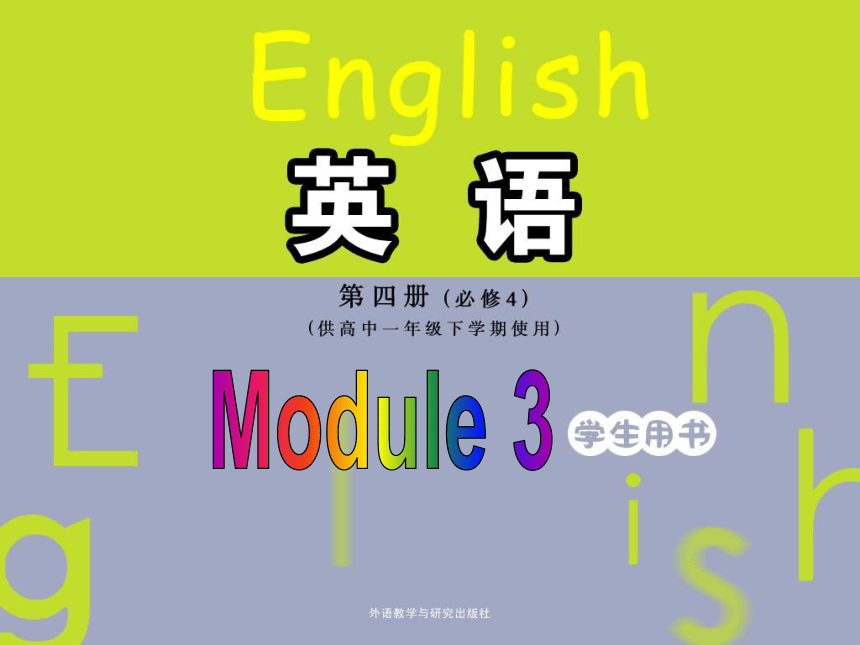
|
|
| 格式 | zip | ||
| 文件大小 | 2.5MB | ||
| 资源类型 | 教案 | ||
| 版本资源 | 外研版 | ||
| 科目 | 英语 | ||
| 更新时间 | 2022-01-30 00:00:00 | ||
图片预览

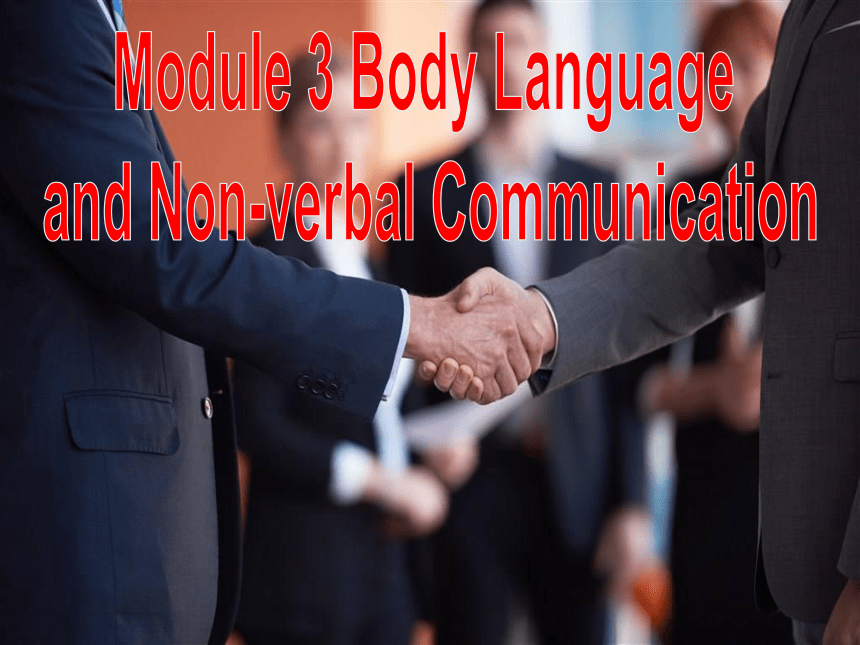

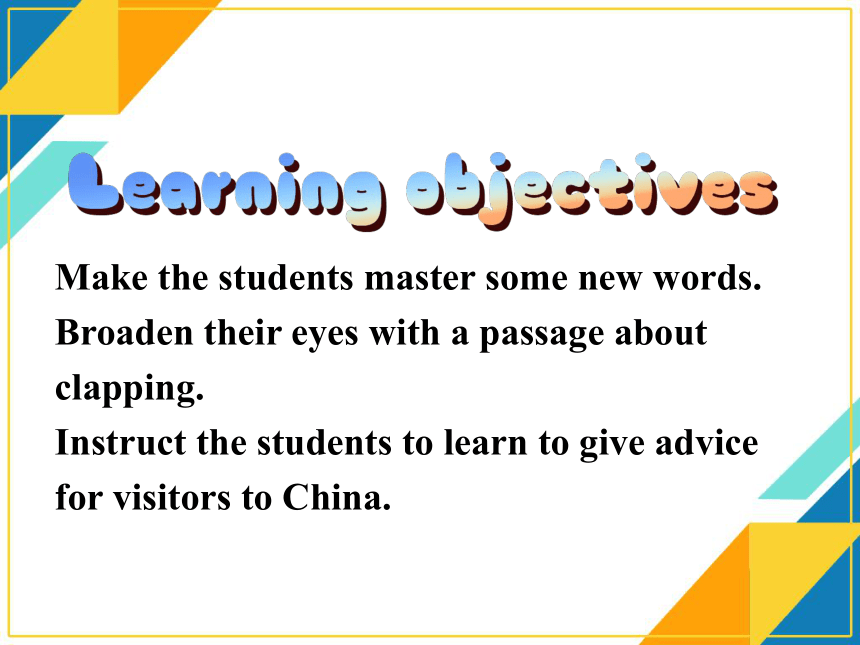

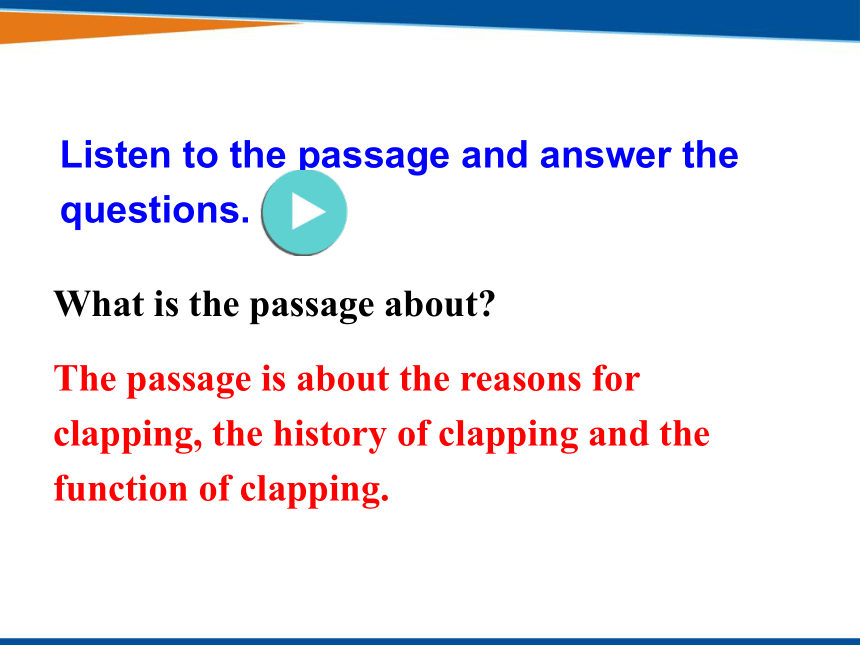

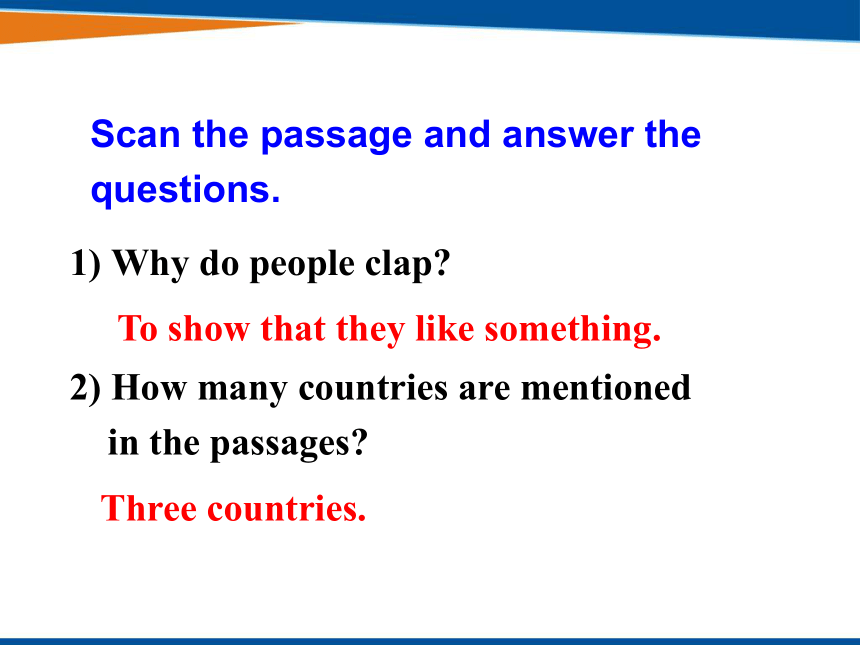

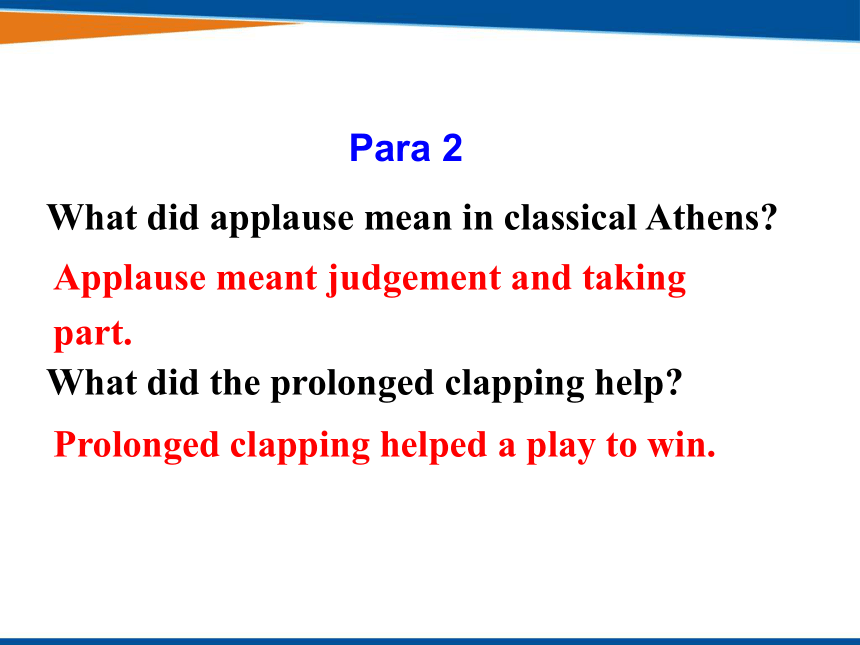
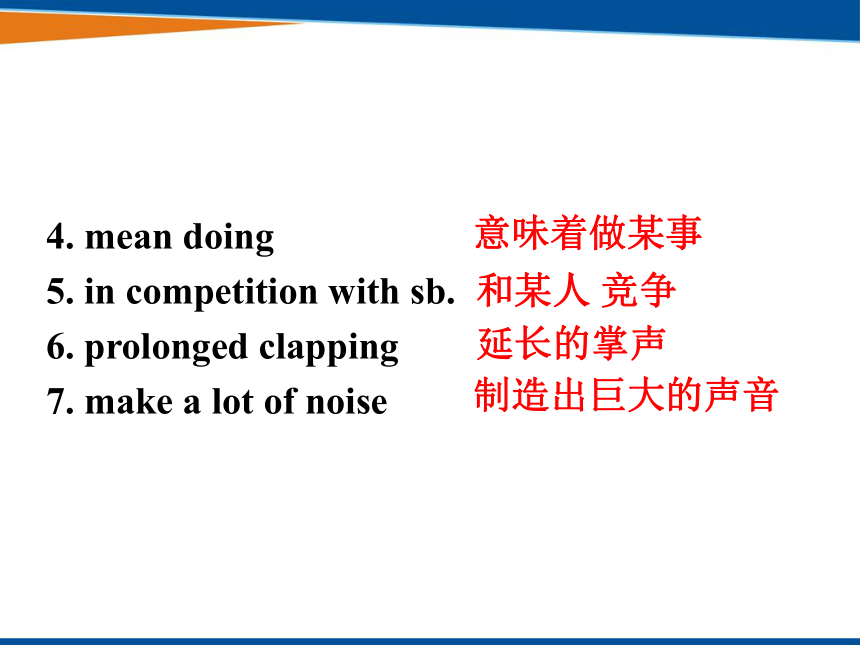
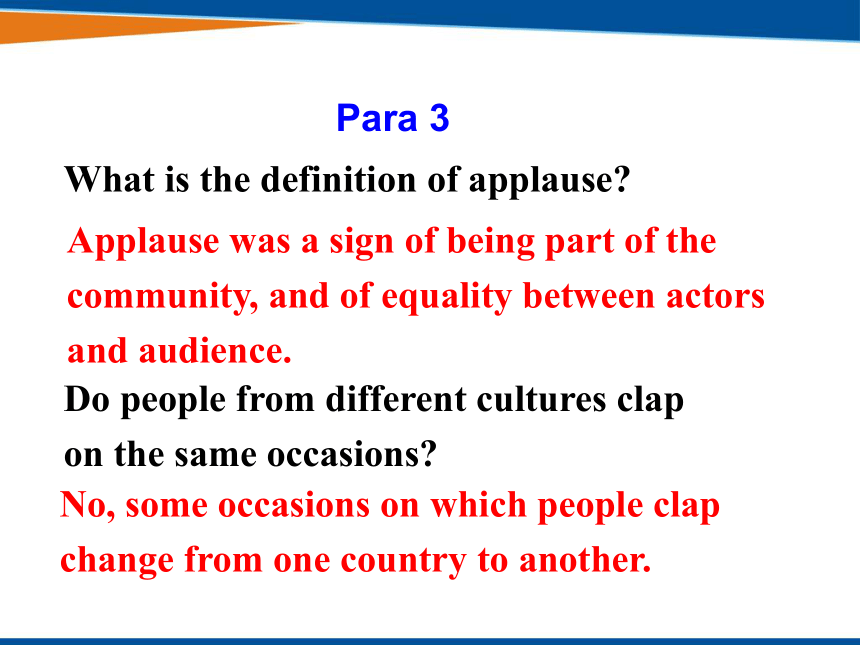
文档简介
(共33张PPT)
Module 3
Module 3 Body Language
and Non-verbal Communication
Cultural corner and Task
Make the students master some new words.
Broaden their eyes with a passage about clapping.
Instruct the students to learn to give advice for visitors to China.
Clapping
Listen to the passage and answer the questions.
What is the passage about
The passage is about the reasons for clapping, the history of clapping and the function of clapping.
The reasons for clapping.
Skim the passage to find out the main idea of each paragraph.
The history of clapping.
The function of clapping.
Para. 1
Para. 2
Para. 3
1) Why do people clap
To show that they like something.
Three countries.
2) How many countries are mentioned
in the passages
Scan the passage and answer the questions.
Para 1
1. On what occasion do people clap
We clap at the end of a live performance, such as a play, or a concert, to say thank you to the performers.
1. at the end of
2. a live performance
3. say thank you to sb.
在…… 的末尾
现场表演
对某人说谢谢
What did applause mean in classical Athens
What did the prolonged clapping help
Applause meant judgement and taking part.
Prolonged clapping helped a play to win.
Para 2
4. mean doing
5. in competition with sb.
6. prolonged clapping
7. make a lot of noise
意味着做某事
和某人 竞争
延长的掌声
制造出巨大的声音
What is the definition of applause
Applause was a sign of being part of the
community, and of equality between actors and audience.
Para 3
Do people from different cultures clap on the same occasions
No, some occasions on which people clap change from one country to another.
8. add…to
9. from one country to
another
10. at a wedding
把 …… 加入到
从一个国家到另一个国家
在婚礼上
Read the passage carefully and fill in
the blanks.
The reasons for clapping ☆To show we 1. ____ something.
☆To say 2. _________ to the performers.
The history of clapping In classical Athens, applause meant 3. _________ and taking part. Prolonged clapping helped a play to 4. _____.
like
thank you
judgement
win
The function of clapping Applause Applause was a sign of being part of the 5. __________, and of equality between actors and audience.
Features It is social and 6. _________.
_________ ☆In Britain people clap at a(n) 7. ________.
☆In Italy they sometimes clap at a funeral.
community
infectious
wedding
Occasions
1. Which is NOT true about clapping
A. We clap to show we like something.
B. The custom of clapping has early beginnings.
C. Britain people sometimes clap at a funeral.
D. Clapping is infectious and spreads very
quickly.
2. What did clapping mean in classical Athens
A. Happiness and thanks.
B. Judgement and taking part.
C. Competition and joy.
D. Welcome and happiness.
3. Why do we clap at the end of a live performance
A. To say thank you to the performers.
B. To show that we like the performers.
C. To complete the performance.
D. Both A and B.
4. In this passage, the writer intends to
________.
A. encourage us to clap at the end of a live
performance
B. tell us of what clapping and applause mean
in different cultures
C. warn us to be careful about the occasions
when we can clap
D. introduce to us the history of clapping
e.g. The cat is playing with a live mouse.
猫在戏弄那只活老鼠。
It wasn’t a recorded show, but it was
live.
这不是录像表演, 这是现场直播。
We clap at a live performance…
live performance 现场演出
live adj. 活的, 生动的, 精力充沛的,
直播的
live, alive, lively与living
live “活着的”,通常指物,不指人,常用来作定语(位于名词前)。还可表示“实况转播的”。
alive 侧重说明生与死之间的界限。即可指人,也可指物;可用来作表语,后置定语或宾补。
lively 意为“活泼的”“活跃的”“充满生气的”,可作定语、表语或宾补, 既可指人,又可指物。
living 强调说明“尚在人间”“健在”,可用来指人或物,作定语或表语。另外,living前加上
the,表示类别,指“活着的人们”。
【语境应用】 完成句子。
1) 这次采访在全欧洲现场直播。
The interview was broadcast ________ across Europe.
2) 小孩子们通常是活泼的。
Young children are usually ________.
live
lively
用live/living/alive/lively填空。
3) The old man is still ________.
4) It wasn’t a recorded show; it was ______.
5) He told us a very ________ story.
6) The enemy officer was caught ________.
living
live
lively
alive
语法填空。
7) —There will be a(n) ________
football match between China and
Brazil on TV tonight.
—What time I can’t wait for it.
live
Task
Prepare some social advice for
visitors to China.
Make a list of social situations to write about. Choose from these topics, or think of others.
meeting people
going to somebody’s house
Eating a meal
Conversation topics
Giving gifts
Write a short paragraph on each topic beginning with if you or when you and use should(n’t) and must(n’t)
Example: When you meet people for the
first time you should shake hands.
Work in pare your advice.
1. in the distance
2. give reasons for
3. body positions
4. body language
5. vary from culture to culture
6. be introduced to
7. on guard
8. develop a formal way
9. shake hands
10. hold a weapon
11. carry a threatening weapon
12. make a deal
13. put the right hand over the left
14. in respect
15. as a gesture of trust
16. greet each other with
17. Give me five! 18. hold up his hand
19. give away 20. a mind reader
21. rely on them 22. for the first time
23. say goodbye to 24. nod your head
25. take your shoes off
26. up and down
27. bend your upper body forwards
28. by accident 29. make a toast
30. take a sip from your glass
31. go blank 32. have a great time
33. be rude to me 34. switch on the radio
35. on earth
36. a live performance
37. say thank you to the performers
38. in competition with
39. prolonged clapping
40. laugh out
41. a universal habit
42. at a wedding / funeral
Fill in the blanks.
1. When a person is angry, he may be a________.
2. While watching the performance, the audience cheered and c_______ their hands.
3. I felt my son’s f_______ and found that he had got a fever.
4. He didn’t have f______ training in school, but he is great in science.
5. We should avoid s_____ at people as it’s bad manners.
ggressive
lapped
orehead
ormal
taring
Choose one of the following situations, and write a short paragraph about what you will do in China, using if you … or when you and should, shouldn’t, must and mustn’t.
meeting people
conversation topics
going to somebody’s house
giving gifts
eating a meal
Module 3
Module 3 Body Language
and Non-verbal Communication
Cultural corner and Task
Make the students master some new words.
Broaden their eyes with a passage about clapping.
Instruct the students to learn to give advice for visitors to China.
Clapping
Listen to the passage and answer the questions.
What is the passage about
The passage is about the reasons for clapping, the history of clapping and the function of clapping.
The reasons for clapping.
Skim the passage to find out the main idea of each paragraph.
The history of clapping.
The function of clapping.
Para. 1
Para. 2
Para. 3
1) Why do people clap
To show that they like something.
Three countries.
2) How many countries are mentioned
in the passages
Scan the passage and answer the questions.
Para 1
1. On what occasion do people clap
We clap at the end of a live performance, such as a play, or a concert, to say thank you to the performers.
1. at the end of
2. a live performance
3. say thank you to sb.
在…… 的末尾
现场表演
对某人说谢谢
What did applause mean in classical Athens
What did the prolonged clapping help
Applause meant judgement and taking part.
Prolonged clapping helped a play to win.
Para 2
4. mean doing
5. in competition with sb.
6. prolonged clapping
7. make a lot of noise
意味着做某事
和某人 竞争
延长的掌声
制造出巨大的声音
What is the definition of applause
Applause was a sign of being part of the
community, and of equality between actors and audience.
Para 3
Do people from different cultures clap on the same occasions
No, some occasions on which people clap change from one country to another.
8. add…to
9. from one country to
another
10. at a wedding
把 …… 加入到
从一个国家到另一个国家
在婚礼上
Read the passage carefully and fill in
the blanks.
The reasons for clapping ☆To show we 1. ____ something.
☆To say 2. _________ to the performers.
The history of clapping In classical Athens, applause meant 3. _________ and taking part. Prolonged clapping helped a play to 4. _____.
like
thank you
judgement
win
The function of clapping Applause Applause was a sign of being part of the 5. __________, and of equality between actors and audience.
Features It is social and 6. _________.
_________ ☆In Britain people clap at a(n) 7. ________.
☆In Italy they sometimes clap at a funeral.
community
infectious
wedding
Occasions
1. Which is NOT true about clapping
A. We clap to show we like something.
B. The custom of clapping has early beginnings.
C. Britain people sometimes clap at a funeral.
D. Clapping is infectious and spreads very
quickly.
2. What did clapping mean in classical Athens
A. Happiness and thanks.
B. Judgement and taking part.
C. Competition and joy.
D. Welcome and happiness.
3. Why do we clap at the end of a live performance
A. To say thank you to the performers.
B. To show that we like the performers.
C. To complete the performance.
D. Both A and B.
4. In this passage, the writer intends to
________.
A. encourage us to clap at the end of a live
performance
B. tell us of what clapping and applause mean
in different cultures
C. warn us to be careful about the occasions
when we can clap
D. introduce to us the history of clapping
e.g. The cat is playing with a live mouse.
猫在戏弄那只活老鼠。
It wasn’t a recorded show, but it was
live.
这不是录像表演, 这是现场直播。
We clap at a live performance…
live performance 现场演出
live adj. 活的, 生动的, 精力充沛的,
直播的
live, alive, lively与living
live “活着的”,通常指物,不指人,常用来作定语(位于名词前)。还可表示“实况转播的”。
alive 侧重说明生与死之间的界限。即可指人,也可指物;可用来作表语,后置定语或宾补。
lively 意为“活泼的”“活跃的”“充满生气的”,可作定语、表语或宾补, 既可指人,又可指物。
living 强调说明“尚在人间”“健在”,可用来指人或物,作定语或表语。另外,living前加上
the,表示类别,指“活着的人们”。
【语境应用】 完成句子。
1) 这次采访在全欧洲现场直播。
The interview was broadcast ________ across Europe.
2) 小孩子们通常是活泼的。
Young children are usually ________.
live
lively
用live/living/alive/lively填空。
3) The old man is still ________.
4) It wasn’t a recorded show; it was ______.
5) He told us a very ________ story.
6) The enemy officer was caught ________.
living
live
lively
alive
语法填空。
7) —There will be a(n) ________
football match between China and
Brazil on TV tonight.
—What time I can’t wait for it.
live
Task
Prepare some social advice for
visitors to China.
Make a list of social situations to write about. Choose from these topics, or think of others.
meeting people
going to somebody’s house
Eating a meal
Conversation topics
Giving gifts
Write a short paragraph on each topic beginning with if you or when you and use should(n’t) and must(n’t)
Example: When you meet people for the
first time you should shake hands.
Work in pare your advice.
1. in the distance
2. give reasons for
3. body positions
4. body language
5. vary from culture to culture
6. be introduced to
7. on guard
8. develop a formal way
9. shake hands
10. hold a weapon
11. carry a threatening weapon
12. make a deal
13. put the right hand over the left
14. in respect
15. as a gesture of trust
16. greet each other with
17. Give me five! 18. hold up his hand
19. give away 20. a mind reader
21. rely on them 22. for the first time
23. say goodbye to 24. nod your head
25. take your shoes off
26. up and down
27. bend your upper body forwards
28. by accident 29. make a toast
30. take a sip from your glass
31. go blank 32. have a great time
33. be rude to me 34. switch on the radio
35. on earth
36. a live performance
37. say thank you to the performers
38. in competition with
39. prolonged clapping
40. laugh out
41. a universal habit
42. at a wedding / funeral
Fill in the blanks.
1. When a person is angry, he may be a________.
2. While watching the performance, the audience cheered and c_______ their hands.
3. I felt my son’s f_______ and found that he had got a fever.
4. He didn’t have f______ training in school, but he is great in science.
5. We should avoid s_____ at people as it’s bad manners.
ggressive
lapped
orehead
ormal
taring
Choose one of the following situations, and write a short paragraph about what you will do in China, using if you … or when you and should, shouldn’t, must and mustn’t.
meeting people
conversation topics
going to somebody’s house
giving gifts
eating a meal
